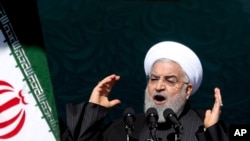Iran's President Hassan Rouhani has used a speech marking the 41th anniversary of the 1979 Islamic Revolution to encourage Iranian voters to participate in upcoming parliamentary elections.
Tens of thousands of Iranians took to the streets of Tehran and other cities and towns on Tuesday for the annual celebrations amid rising public dissatisfaction over Iran's faltering economy, which has been hard-hit by U.S. sanctions, and anger over the country's military shooting down a Ukrainian jetliner last month.
Holding Iranian flags and portraits of the founder of the Islamic republic, the late Ayatollah Ruhollah Khomeini, crowds converged on Tehran's central Azadi (Freedom) Square, where Rouhani delivered his speech.
State TV showed video footage of rallies in other cities including Mashhad, Ahvaz, and Kerman.
Rouhani called on voters "not to be passive" in the Feb. 21 vote despite "possible complaints and criticism" after the hardline Guardians Council disqualified thousands of candidates from running, including 90 current lawmakers.
"I beg you not to be passive," the president said.
Rouhani also struck out at the United States, which he said found it "unbearable" that Iran's clerical establishment remains in place more than four decades after Khomeini's followers ousted the last government of U.S.-backed Shah Reza Pahlavi.
The United States "has put so much pressure on our beloved people, on all of our trade, all of our exports, all of our imports, and all of the country's needs, to exhaust the patience of our people," Rouhani said.
But "the Americans did not understand the greatness of the Iranian people," he told the crowd holding banners with slogans such as "Death to America" and "We will resist until the end."
When officials announced gasoline rationing and price hikes in November, anti-government protests erupted in more than 100 Iranian cities and turned violent before security forces put them down amid an Internet blackout.
In 2018, the United States withdrew from a nuclear agreement between Tehran and world powers and has since reimposed tough sanctions on the Iranian economy.
Tehran has gradually stepped back from its own commitments under the 2015 deal and while it has said it no longer considers itself bound by the pact, Rouhani said on Feb. 3 that his country was ready to "return to its commitments" under the deal when other parties uphold theirs.
Tensions between Tehran and Washington escalated in early January after the killing of Iranian Major General Qassem Soleimani, the leader of Iran's elite Quds Force, in a U.S. air strike near Baghdad.
In response, Tehran launched missile strikes on two bases hosting U.S. troops in Iraq. The Pentagon says 109 U.S. service members have been diagnosed with mild traumatic brain injury following the attack on Ain al-Asad Air Base in western Iraq, though no one was killed.
With Iran's air defenses on high alert following the missile attack, a Ukraine International Airlines flight was shot down after taking off from a Tehran airport, killing all 176 people aboard.
Iranian authorities initially denied any responsibility for the accident. But three days after the tragedy the Islamic Revolutionary Guards Corps admitted the plane had been shot down "unintentionally," leading to days of protests in Iranian cities, with demonstrators chanting slogans against Iran's clerical leadership.

